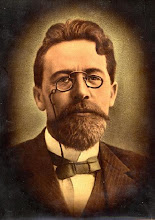I related this story to "The Fly" by Katherine Mansfield. Both of these stories revolve around grief and both the boss and Iona are dealing with the grief of the death of their sons. Both Mansfield and Chekhov illustrate the emotional state of these characters through a narrative without much insight into the characters minds. Both stories also have a simple act that define their emotions as well. The boss kills the fly and Iona tells his mare about his son's death.
Charles May points out that the story, "maintains a strictly objective point of view to communicate the latent significance of the protagonist's emotional state" (16). This is part of what defines Chekhov as a realist writer. This story simply describes the setting and action that is used to express the inner feelings of Iona. May enforces this point by saying Chekhov is "creating the illusion of inner reality by focusing on externals only" (53).
One gap I encountered while I read was wanting to know more about Iona's death. I am not sure if it was Chekhov's intent to stir this kind of interest in the reader, but I thought it was significant that while I wanted to hear Iona's story, none of the other characters would give him a chance to tell it.

This comment has been removed by the author.
ReplyDeleteI think your quote from May is very significant and that is precisely what Chekhov has done in his story. It is a central element of the story and is done in a very brilliant way. I also liked your observation of the opening scene and "reflecting a feeling of cold death". This is could be aesthetic patterning as well, since there are many elements that would fit this observation. -Jay Venegas
ReplyDeleteAs Jay said I enjoyed your use of the phrase "cold death" to describe the opening passage. Also, your use of the May reflection on this story was very interesting. It was not something I thought to do and should definitely be included in the final statement for our group. (con't KT)
ReplyDeleteThe gap you pointed out in the son's death was also interesting to me. I found that I too wanted to know more about it, but did not think to mention that in my response. Finally, I would say that maybe more of a response to the story itself would be nice as there are many more aspects to the story that I'd like to hear everyone's opinions on. - Karen Thacker -
ReplyDeleteLots of good points, nice response!
ReplyDelete-Loved this line, "Iona was so desperate to alleviate his grief and loneliness, that he even enjoyed the company of the three rude and abusive men in his cab."
-Comparison to "The Fly"- both about death of their son. Would have never even remembered that. Could be useful for a contrast and comparison type thing?
-Awesome stuff from May
-Interesting you focused so much on wanting to know more about how Iona's son died. That didn't even phase me - will be interesting to discuss this tomorrow!
-Lauren
I thought the concept of the parallel between the setting and Chekhov's description of Iona as "old and bent over double" and the idea of death was an interesting one.
ReplyDeleteAlso, I like your acknowledgment of the gap with Iona not telling the story of his son's death at all. This I thought Chekhov did on purpose to kind of exemplify the fact that not only is Iona unsettled by not being able to tell his story but his misery lies more within him not having anyone to talk to.